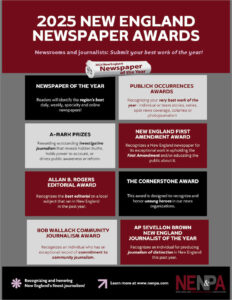Foster’s Daily Democrat, Dover, NH
“Press works for the people, not the county”
The New England First Amendment Award is presented to a New England newspaper that shows leadership on First Amendment issues, either by the exceptional quality of its reporting, editorials, commentary or legal challenges that illuminate or uphold the First Amendment or educate the public about it.
One of the most fundamental principles of journalism is to operate with independence. A newspaper cannot be a watchdog if it is simultaneously working on behalf of the government. The First Amendment, in all its wisdom, protects the press from being forced to collaborate with the very powers it’s obligated to check.
So when a county attorney in New Hampshire attempted to compel a local reporter to release all his notes and materials related to an unpublished jailhouse interview, this fundamental principle of independence suddenly appeared vulnerable.
“The danger in the state compelling the release of this unpublished material is that it has the potential to turn our news reporters into agents of the state, which will badly undermine our credibility with the public and news sources,” explained Howard Altschiller, executive editor at Seacoast Media Group where the reporter Brian Early worked.
Through a series of legal challenges, Seacoast Media Group successfully defended its First Amendment right to withhold Early’s notes. Rather than acquiescing to the county attorney’s demand, the media group dug in and protected its independence — a victory not just for its newsroom, but for the First Amendment.
Seacoast deftly covered the case using additional reporters to maintain objectivity. It used its editorial pages to emphasize the key arguments of its case and to explain to the public the First Amendment interests at stake. While recognition is deserved by any newspaper aggressively defending its constitutional rights, Seacoast Media Group’s work to defend its independence is especially notable and worthy of this year’s First Amendment Award.

